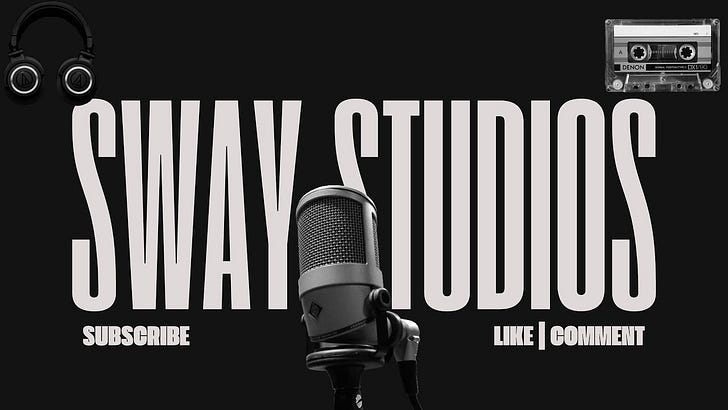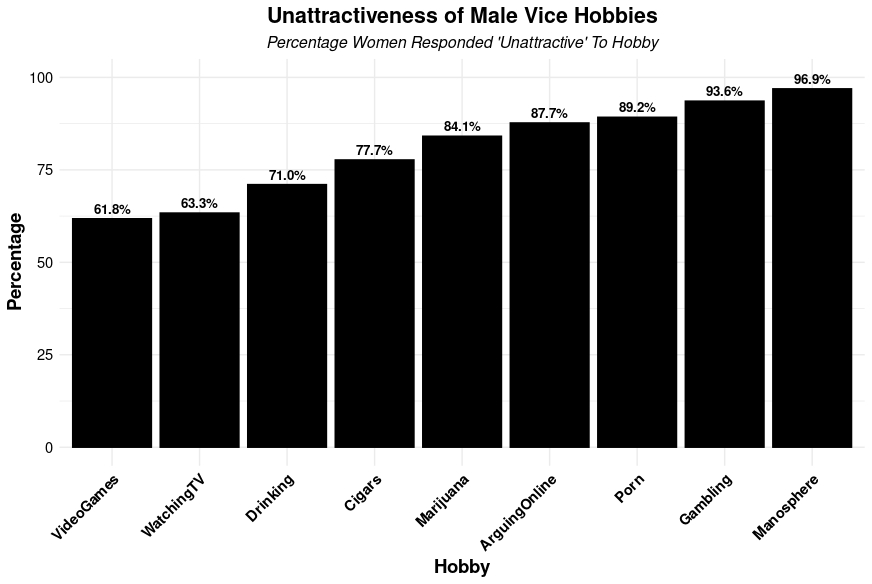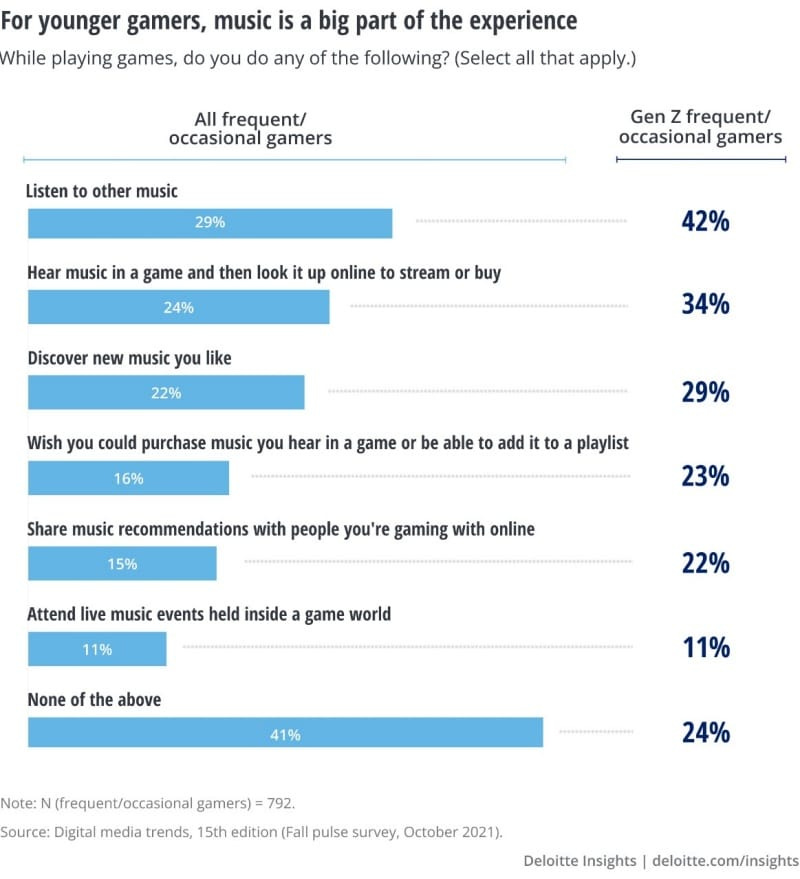TLDR: Music & Gaming interview with Eric Tan (8.10.24)
Key Points & Further Notes from my recent chat with Eric Tan.
Had a lovely time chatting to the incredible Eric Tan on the 8th October 2024 about the music business and how it interacts with video games.
Eric Tan is a true music industry heavyweight, known for forging top-tier music and gaming partnerships with giants like Gameloft (e.g Spider Man Unlimited), EA (e.g Need For Speed: Hot Pursuit), and Riot Games (e.g Valorant). Now, with his new venture, SWAY, he’s created a direct line to his expertise - no brainer!
Similar to my last feature, I’m going to go over a few points I wanted to make, keeping it lean:
Gaming Stigmas
During this conversation, I spoke about there being some negative stigma to gaming as I grew up. Back in the 00’s, many of my peers were given the same line from their parents: ‘you shouldn’t spend too much time playing video games’. Take a look at the chart below, where almost 62% of a study group claimed video games was an ‘unattractive hobby’ for a man.
(And let’s ignore the satirical post from Liz Wheeler on X).
This article in the Guardian summarises the social stigma with gaming, and summarises the point I’d like to get across very well:
“The main difference between people who understand video games and those who are dismissive of them isn’t personality, in my experience – it’s exposure.“
If people of all ages are being exposed to more games given ease of access (e.g free mobile games), and continue to play games as they grow older as I suspect, then surely there will be more gamers in years to come? Here’s a forecast by Statistica, forecasting number of worldwide gamers until 2029.
This is not only about a growing global population. I’ve spoken before about how Roblox isn’t just for kids because a stereotype is often frozen in time, but people and culture aren’t. Things change. It’s only up from here.
Licensing: Equity vs Buyout
During my conversation with Eric, he asked me about my advice for deal terms - asking for equity in a game, or getting a buyout and receiving an instant sum of cash.
I referred to an article - ‘The Witcher’ Author Demands $16 Million in Royalties From CD Projekt Red.
(I forgot that it was an author, rather than a composer, until re-reading it - but the principle is similar)
Game companies often prefer buyouts, giving them full control and a one-time payment, making it easier to engage content creators without Content ID issues. However, artists can benefit from equity, which links their success to the game’s performance, though it might sacrifice upfront cash and impact content creator dynamics—a key factor for music.
My advice to artists would be to ask and negotiate towards what suits you. This topic is so big it probably needs its own Substack because there are so many variables (I genuinely find negotiation so much fun!).
‘Expression’ vs ‘Encouragement’
As big brands appear in game platforms, there is a growing trend of huge artists appearing within bespoke experiences or features in games. I reference my theory called ‘The Billboard Theory’, which says that big advertisements should be reserved for household names rather than access to purchased credential.
I consider this as gaming companies using artists as ‘expressions’, perhaps to give commercial micro-transaction opportunities to record labels in exchange for street cred. Nothing wrong with that by the way! There is a time and a place for it - for example, this weekend, Snoop Dogg & Ice Spice took over Times Square to do a real life show that was streamed in-game, solely to promote Fortnite’s new chapter where more than 10 million people tuned in to watch.
On the other hand, my opinion is that people discover music on games, and this is underutilised by the music industry as a strategy for less established artists. Deloitte has some interesting research on this, suggesting that 29% of Gen Z gamers discover new music through games. So when Roblox recently confirmed they have 88 million daily players, that percentage doesn’t seem so small…
If this is the case, then there is a clear demand for a music discovery ecosystem to exist in modern games. To me, this approach ‘encourages’ music, and has proven memorable value for both games and music alike. Look at anything Tony Hawks / SSX / GTA / FIFA related for evidence.
Players may remember the ‘expressions’, but I think if ‘encouragement’ is done correctly, any game can become a world class tastemaker.
IMO Encouragement wins. Steve Schnur agrees.
Today’s successful artists
Eric asked me what I found interesting in this space right now, and I turned to the most successful artists on the music scene, what I think a common thread is between them, and how that could interact with video games.
I had stated that if an artist’s values match with a video game’s values, and they find a well considered way to integrate this into the narrative of the story so that it feels natural, then that can’t go wrong. But in hindsight, maybe values wasn’t the right word. when I learned about ‘values’ in communication studies many moons ago, it was defined as “the habits and aspirations that guide how someone communicates”
Instead of defining it, let me turn to The Hedgehog Principle by Jim Collins - “It’s about focusing on what you do best and ignoring what’s not essential or outside your expertise.“
I forsee the best music & gaming partnerships coming where an artist and a game both share similar characteristics in personality & aesthetic, and find a beautiful way to integrate with the story that make sense to both worlds. Red Dead Redemption 2 is a great example of this, where D’angelo is a genuine fan of the game and wanted to write a track for the game which sounded perfect for the world, as well as for his style & sound. This approach considers macro long-term trajectory for both sides, as well as prioritising an enrichment of the experience through appropriate and considered inclusions…Easier said than done.
How big artist and games collaborate seamlessly
Each artist/game and their respective industry have their own priorities and problems to focus about. Understanding an entirely different industry requires specialist knowledge that goes across both worlds. If each company wants to win, it makes sense to employ people with that specialist knowledge to identify and nurture those spaces appropriately and delicately. This idea is discussed further in the GxM podcast interviewing the legendary Vickie Nauman which I’ll link here:
Avoiding being defined by a game inclusion
This is a consideration that is often only on the shoulders of the artist/composers, but should be a consideration of the music and gaming companies to consider. I notice I never gave solid advice here, so I’d say artists should have three things:
Have an independent marketing plan for their music journey regardless of inclusion that you can continue with/go back to anytime.
Have a plan for the ‘chapter’ where you document your journey working with a game, its announcement, feature, interaction with new fans, resharing content from the game, behind the scenes, Reddit AMAs…list goes on.
And then have a plan afterwards of how to carry any new fans beyond the game back to your original campaign, looping back around to the first plan when this is done. This could be as simple as lining up a few additional things to focus on in the future so that you are never defined by a ‘peak’ and that you are diverse and always evolving.
People love potential - so my advice is to set a load of small goals you can achieve, but most importantly set a grand goal you can work towards that is so big it’s almost unattainable.
I won’t do a TLDR for a TLDR, but I would genuinely welcome any comments on my thoughts, any of my posts, criticisms or additions etc. This is my learning documentary after all, and there is much more to discovery. It’s almost like I set myself an unattainable goal, who would have thought?







